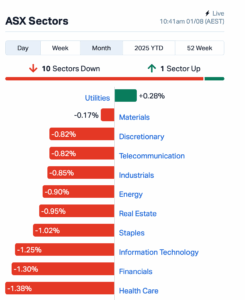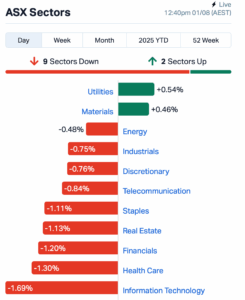
On the back of a profitable FY25, MoneyMe has high hopes for FY26. Picture via Getty Images
- MoneyMe beats FY25 operating cash profit target
- Loan book stronger and cleaner at $1.6bn
- Mastercard issuer status and AI push set up FY26
Special Report: Fintech lender MoneyMe wrapped FY25 with operating cash profits above expectations, a stronger loan portfolio and a fresh Mastercard issuer badge. Now it’s rolling into FY26 with momentum and AI in sight.
MoneyMe’s foot stayed firmly on the pedal in the final stretch of FY25, delivering a strong fourth quarter.
The numbers not only beat its own expectations, but also showed signs of a lender that’s getting leaner and more confident with every turn of the economic wheel.
And it’s doing so in an environment that hasn’t exactly been a cruisy downhill ride.
Between changing rates and growing scrutiny on credit quality, MoneyMe has kept pace, and then some, by doubling down on technology, high-quality lending and scalable funding.
Profit lands above the mark
For the full year, MoneyMe clocked $24 million in operating cash profit (OCP), which came in 20% above the $20 million previously flagged.
That included a one-off ~$10 million benefit booked in the first half.
But even adjusting for that, the result reflects the company’s ability to generate consistent growth and margin in a tough credit cycle.
“MoneyMe ended FY25 with a strong final quarter, continuing the momentum through the year,” said CEO Clayton Howes.
“We executed well on strategy, growing our loan book, improving key portfolio metrics and delivering strong operating performance, with full year operating cash profit exceeding expectations at approximately $24m.”
The loan book hit $1.6 billion by the end of June, up a solid 28% on last year and 6% on the March quarter.
Fourth-quarter loan originations were $235 million, up 37% year-on-year and slightly ahead of Q3.
Of those originations, 59% were secured loans (excluding credit card usage), primarily from MoneyMe’s secured car loan product, Autopay.
Better lending book
More than half of the total loan book is now secured, with secured assets making up 62% of the portfolio.
This figure is up 7% from a year ago, and 1% from Q3.
What that means in practical terms is that MoneyMe isn’t just writing more loans, it’s strengthening its loan book with more stable, longer-dated loan assets with lower associated risk.
The average customer credit score climbed again to 790, up from 760 a year ago and 1% above the March quarter.
Net credit losses dropped to 3.4%, down from 4.5% last year and 3.7% in Q3.
“Net credit losses were significantly lower year-on-year, reflecting our ongoing focus on high credit quality and secured assets,” Howes said.
Put simply, the portfolio is growing and getting stronger at the same time.
Revenue holding up, margins holding ground
Fourth-quarter revenue came in at $55 million, flat on last year but up 4% from Q3, again reflecting the steady build of a higher-quality loan book.
The net interest margin (NIM) held at 8%, which is down from 10% a year ago, but in line with Q3 and consistent with the mix shift toward lower-risk, secured lending.
“With our funding costs reducing, we’ve been able to better price our products in the market,” said Howes.
That pricing shift is helping the company stay competitive while protecting margins and improving customer retention.
Not a bad recipe in a cautious lending cycle.
Funding firepower and global reach
Behind the scenes, MoneyMe’s funding engine has also levelled up.
The company drew down another $10 million from its $125 million corporate facility with iPartners during the quarter to support loan book growth.
It’s also continuing to drive funding efficiencies through warehouse optimisations and ABS transactions.
Those efforts culminated in a $200 million personal loan asset-backed securities (ABS) deal completed in July, which attracted strong offshore investor demand.
Read later: Non-bank lender MoneyMe turbocharges growth with ABS
“Our momentum has continued into the new financial year,” said Howes.
“In July, we closed a $200m personal loan ABS transaction, attracting strong offshore investor demand and reinforcing confidence in the quality of our assets.”
The company noted that ongoing improvements in funding costs are now being realised, and expected to support further margin improvement in FY26.
Tech in the driver’s seat
While the funding engine is purring, the technology wheelhouse is quietly shifting up another gear.
MoneyMe’s in-house AI platform, AIDEN, continues to do more of the heavy lifting – driving operational efficiency and sharpening credit risk management.
The company is already pushing into “agentic AI”, expanding AI’s role across operations.
At the same time, it has secured Mastercard principal issuer status, as well as teamed up with Episode Six to fast-track a new credit card launch in 2025.
“MoneyMe remains focused on delivering bank-beating credit experiences, with faster, more innovative and better-value products that are resonating strongly with consumers and partners,” said Howes.
The year ahead
Looking ahead into FY26, MoneyMe is doubling down on its strategy.
Management expects continued strong loan book growth, improved credit performance, and “healthy risk-adjusted margins”, with operating cash profit forecast to remain strong.
The company’s strategy is clear.
It’s sharpening its tech edge with AI and automation. It’s sticking with secured, high-quality lending while growing personal loans and credit cards.
And it’s also cutting funding costs via ABS markets, expanding products such as Autopay and credit cards, and staying true to its ESG values as a Certified B Corp.
“Our investment in AI, including the adoption of agentic AI, continues to drive operational efficiency and enhance our customer experience,” said Howes.
The company looks to be lining itself up for a FY26 that could potentially outpace expectations once again.
This article was developed in collaboration with MoneyMe, a Stockhead advertiser at the time of publishing.
This article does not constitute financial product advice. You should consider obtaining independent advice before making any financial decisions.



